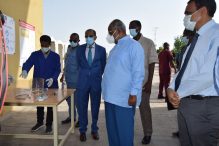REQUEST FOR EXPRESSIONS OF INTEREST ENVIRONMENTAL AND SOCIAL SAFEGUARDS SPECIALIST
(CONSULTING SERVICES – INDIVIDUAL CONSULTANT SELECTION)
Country Regional / Ghana
Project Title Africa Higher Education Centers of Excellence for Development Impact (ACE Impact)
GRANT No. D4293
Project ID No. P164546
Assignment Title: Consultancy Services for the engagement of Environmental and Social Safeguards Specialist at the Regional Facilitation Unit of the Association of African Universities
Reference No.: GH-AAU-81649-CS-INDV
The Association of African Universities has received financing from the World Bank toward the cost of the First Africa Higher Education Centers of Excellence for Development Impact Projects (ACE Impact 1 and intends to apply part of the proceeds for consulting services.
Objectives of the assignment
The main objective the consultancy is to support and strengthen Safeguards due diligence of the Regional Facilitating Unit in ensuring compliance with World Banks Safeguards Policies and relevant National Environmental and social laws of participating countries of the ACE Impact Project.
The consultant shall provide clear, comprehensive and practical guidance to the RFU, country focal points (government representatives responsible for coordinating at the national level) and universities on integrating an environmental / social due diligence process from the prepared ESMF and site specific ESMPs during the specific ACE project implementation.
The detailed Terms of Reference (TOR) for the assignment can be found by clicking on the link below:
https://blog.aau.org/wp-content/uploads/2020/07/TOR-for-Engagement-of-ES-Consultant-for-RFU.docx
The Association of African Universities now invites eligible individuals (“Consultants”) to indicate their interest in providing the Services.
Competency and Expertise
Interested Consultants should provide information demonstrating that they have the required qualifications and relevant experience to perform the Services.
The shortlisting criteria are:
- At least Masters’ degree in Environment or Natural Resources Management or Social Sciences or related disciplines
- At least ten (10) years’ working experience in environmental and social assessment for development projects
- Possession of relevant professional qualifications in Environmental issues
- Familiarity World Bank’s safeguard policies and procedures
- Fluency in English and French and ability to write and present in these languages.
The attention of interested Consultants is drawn to Section III, paragraphs, 3.14, 3.16, and 3.17 of the World Bank’s “Procurement Regulations for IPF Borrowers” July 2016 and revised in November 2017, and August 2018 (“Procurement Regulations”), setting forth the World Bank’s policy on conflict of interest available on this link http://pubdocs.worldbank.org/en/178331533065871195/Procurement-Regulations.pdf .
Individual consultants will be selected will be selected in accordance with the World Bank’s “Procurement Regulations for IPF Borrowers” July 2016 and revised in November 2017, and August 2018 (“Procurement Regulations”).
Further information can be obtained at the address below during office hours 0900 to 1700 hours.
Expression of Interest
Interested individual Consultants must provide information (Detailed CV, cover letter and relevant educational and professional qualification documentation) indicating that they are qualified to perform the services for the specific position described above.
Expressions of interest must be delivered by registering using this link https://www.research.net/r/ESSSAce20 by Tuesday July 28, 2020
Contact:
Sylvia Mkandawire (Dr.) Program Manager ACE Impact
Association of African Universities
African Universities House, Trinity Avenue, East Legon, Accra, Ghana
P. O. Box AN 5744, Accra-North, Ghana
